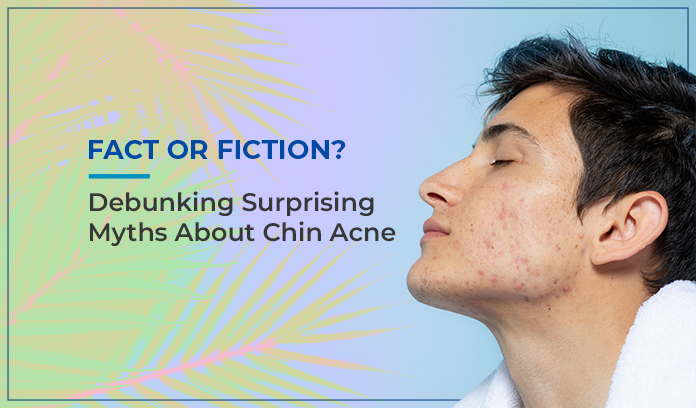Among the different kinds of acne, chin acne, in particular, can be frustratingly difficult to deal with. While seeking countless solutions to get rid of these pesky blemishes, people often fall prey to misleading claims or information about chin acne.
In this blog, we aim to debunk some surprising myths about chin acne to help you make informed decisions that guide you toward effective treatment options.
Myth#1: Chin acne is a result of poor hygiene
One of the most pervasive myths about the onset of chin acne is that it’s caused by not washing your face enough or poor personal hygiene.
Chin acne, like traditional acne, is caused by hormonal changes, excess oil production, and pore blockage.
While it’s important to keep your skin clean, using harsh products or overcleaning may be more detrimental to your chin acne than you know.
Myth#2: Only teenagers get chin acne
Contrary to the persistent belief that only teenagers face chin acne breakouts, adults also experience chin acne from time to time.
While it’s common for stress and certain medications to trigger acne breakouts, hormonal fluctuations during pregnancy, menstruation, or menopause can trigger serious acne in women.
Myth#3: Chocolate and greasy foods cause chin acne breakouts
The myth that consuming chocolate or greasy foods leads to chin acne has been a long-held belief.
Many scientific studies have not been able to establish a direct link between diet and acne, as acne development is more closely tied to genetic makeup, hormonal factors, and skin sensitivities.
Myth#4: Sun exposure helps clear chin acne
Another unusual yet pervasive myth is that sun exposure can dry out acne and help clarify the skin.
While it may seem to dry out acne marks, prolonged sun exposure can lead to more damage than good.
Excessive sun exposure causes hyperpigmentation, premature aging signs, and even worsens acne symptoms in the long run.
Myth#5: Popping pimples is an effective way to get rid of chin acne
While it may seem tempting to pop a pimple on your chin, it can worsen or aggravate your acne condition. Popping pimples can lead to further scarring, inflammation, and even infection.
It’s best to avoid the temptation of popping or squeezing your chin acne. Opt for gentle anti-acne treatments instead with gentle, non-comedogenic products that tend to skin sensitivities.
Conclusion
It’s wise to remember that while seeking desperate solutions for acne problems can be tempting, it is a complex skin issue caused by multiple underlying factors.
As the treatment varies from person to person, consulting a dermatologist can aid in a targeted approach tailored to your skin’s unique makeup.











